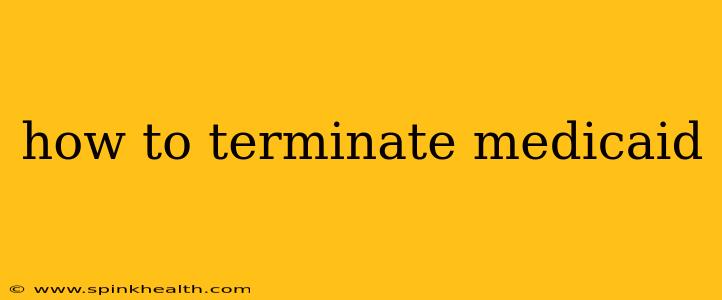How to Terminate Medicaid: A Guide Through the Complexities
Navigating the process of terminating Medicaid can feel like traversing a maze. The rules and regulations vary significantly depending on your state and individual circumstances. This isn't a simple "how-to" with a single, universal answer; rather, it's a guide to understanding the process and finding the resources you need. Think of this as your map through that maze.
My name is Sarah, and I've spent years assisting individuals with navigating the complexities of government assistance programs. I understand the frustration and confusion this process can cause, and I'm here to shed some light on the path forward. Remember, this information is for general guidance only and doesn't constitute legal advice. Always consult with your state's Medicaid agency or a qualified legal professional for personalized advice.
Why Would Someone Want to Terminate Medicaid?
Before diving into the how, let's address the why. Several reasons might lead someone to want to end their Medicaid coverage:
- Increased Income: If your income rises above the eligibility limit, you may no longer qualify for Medicaid. The agency will likely inform you of this change.
- Change in Health Insurance: You may have obtained employer-sponsored insurance or purchased a private plan, rendering Medicaid unnecessary.
- Moving to a New State: Medicaid eligibility is determined at the state level, so a move to a new state requires reapplication and could result in termination of your current coverage.
- Change in Family Status: Changes such as marriage or divorce can impact eligibility.
- Incorrect Information: If you provided inaccurate information during your application, your Medicaid could be terminated.
How Do I Terminate My Medicaid Coverage?
There's no single "termination button." The process depends largely on why you're seeking to end coverage.
- Automatic Termination: As mentioned, if your income increases beyond the eligibility threshold, Medicaid will typically terminate your coverage automatically. You'll receive notification from your state's Medicaid agency.
- Voluntary Termination: In some cases, you can voluntarily request to end your Medicaid coverage. This usually involves contacting your state's Medicaid agency directly. You'll need to provide your identifying information and clearly state your intention to terminate coverage. Be prepared to provide a reason for your request, although this isn't always mandatory.
- Ineligibility Due to Changes: Life changes – a new job, marriage, or relocation – may render you ineligible. The state's Medicaid agency will assess your situation and inform you of your status. You may need to update your information with the agency.
What Happens After I Terminate Medicaid?
After termination, your Medicaid coverage will end on a specified date. This date is typically communicated in writing from the Medicaid agency. It's crucial to understand that once your coverage ends, you are responsible for all medical expenses.
What if I Need to Reapply for Medicaid Later?
If, at a later date, your circumstances change, and you need to reapply for Medicaid, you will have to go through the full application process again.
How Do I Find My State's Medicaid Agency?
The contact information for your state's Medicaid agency can easily be found through a simple online search: "[Your State] Medicaid." Their website will have the necessary contact details and potentially FAQs to address your specific questions.
What if I Have Questions About My Medicaid Eligibility?
Don't hesitate to reach out to your state's Medicaid agency. They are the best resource for answering questions specific to your situation. Remember, they are there to help guide you through the process.
Navigating the world of Medicaid can be complex. This guide aims to provide a clearer path, but remember, seeking personalized advice from your state agency or a legal professional is crucial to ensure you're making informed decisions. Your health and well-being are paramount, and understanding your options is a crucial first step.

